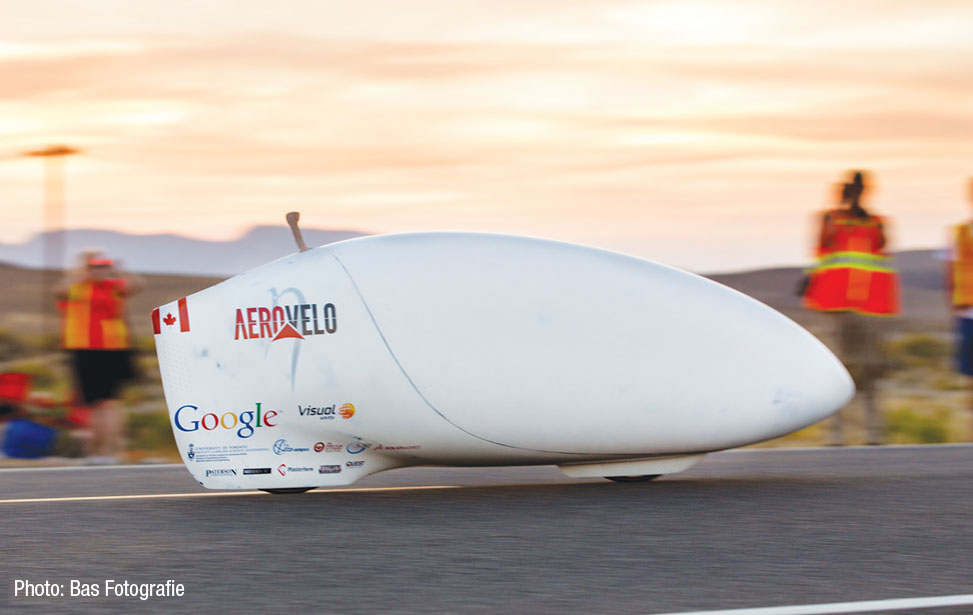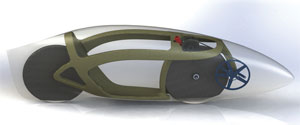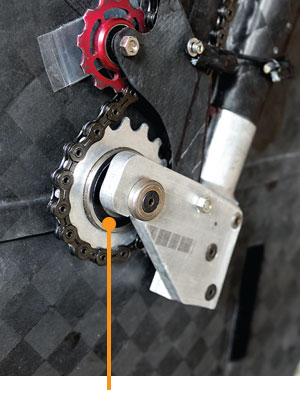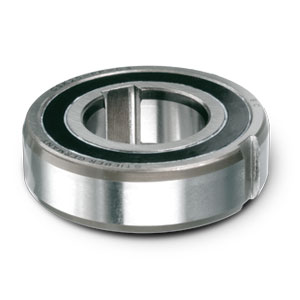
Humans have an innate thirst for adventure and an instinctive desire
to expand their knowledge through firsthand experience. By testing
the limits of personal strength and endurance, we obtain a better
understanding of ourselves. One aspect of adventure is the art of
competition. Team AeroVelo, comprised of professionals and
engineering students from the University of Toronto, pursue this
quest for adventure by joining others in an attempt to set the world
human-powered speed record.
Every year, teams gather from around the world to compete at the
World Human-Powered Speed Challenge (WHPSC) in Battle Mountain,
Nevada. Team AeroVelo brought their newly designed “Eta” speed bike
to the 2014 competition. AeroVelo, an elite design and innovation lab,
pursues engineering projects that foster a sense of adventure and passion
in scientific development, challenge the norms of conventional design,
and focus on a healthy, sustainable future.
“We’re very small and right now our main activities are the student
summer projects, public speaking & outreach and limited consulting
on wild engineering projects,” states Cameron Roberston, co-founder
of AeroVelo, Inc. "AeroVelo partners with the University of Toronto’s
Human-Powered Vehicle Design Team (HPVDT) and shares the team
workspace full-time during the summer," according to Robertson.
HPVDT, comprised of top-notch U of T undergraduate students
in aerospace, materials, and mechanical engineering, focuses on the
design and construction of innovative, high-performance human-powered
vehicles. The goal of the AeroVelo/U of T partnership is to provide
students with hands-on, practical engineering design experience that
promotes efficiency and sustainability while encouraging the reduction
of society's impact on the environment. Each year the student team has 4
months to engineer and build a human-powered vehicle.

Internal bike render.
The students do not receive college credit for participating in the
summer program. However, "The students' time at AeroVelo counts
toward a 600-hour engineering experience required of all graduates,"
Robertson said. “For students, it’s similar to a research internship in a
lab, but the design freedom, creative opportunities and time spent in
hands-on fabrication are above and beyond what is available elsewhere.”
Robertson has also indicated that, “This summer, all of the students have
been extremely motivated and have very quickly picked up on many of
the design concerns and tradeoffs in developing this year’s high-powered
speed bike. Students with no specialization in bicycles or aerospace have
quickly become familiar with both.”
“Eta,” the name of AeroVelo’s 2014 speed bike, is the Greek letter
used in engineering as the symbol for efficiency, and represents the team’s
goal of building the world’s fastest human-powered vehicle, capable of
breaking the current ground level speed record of 133.8 km/h (83.1mph).
The speed bike’s internal components are as equally fundamental
to the successful performance of the bike as the aerodynamic design. A
portion of Eta’s transmission is designed to use a more efficient chain
than what is typically used in bicycles. According to Alex Selwa, a
member of the U of T student engineering team, “Most bicycles have a
free-wheel which allows the wheel to rotate even when the pedals and
chain are stationary. In our front-wheel drive design we are not using a
standard bike chain and cannot use an off-the-shelf bicycle free-wheel.”
Instead, an overrunning clutch solution was required.

The Stieber CSK clutch was press fit onto the front wheel hub body, and pressed inside of the sprocket. It is responsible for driving the wheels up to 145 km/h (90 mph).
After careful research, the team contacted Formsprag Clutch in
Warren, Michigan to request an overrunning clutch solution. Formsprag,
an Altra Industrial Motion Company, donated a Stieber CSK25 PP
overrunning clutch to the AeroVelo team as part of Formsprag’s Student
Support Program. The CSK clutch was a clear choice to accommodate
the size and load requirements of the unique hub. “The front hub design
involved fitting many different components into a small and efficient
package. The clutch needed to be as small as possible in order to fit inside
the sprocket and stay within the width requirements of the hub,” explained
Selwa. “The clutch is press-fit onto the hub body and then pressed inside
of the sprocket. It is responsible for driving the wheels at speeds up to
145km/h or 90 mph.”

The Stieber Model CSK25 PP overrunning
clutch features ultra-hard Formchrome® sprags which provide extra-long life, maximum wear resistance and lower maintenance costs. Formchrome sprags – exclusive to Stieber/
Formsprag – are made by diffusing chromium into the surface of hardened high carbon alloy steel to form a chromium-carbide alloy.
Stieber’s model CSK25 PP is a bearing-supported sprag-type clutch,
delivered grease-lubricated and protected against dust particles as small
as 0.3 mm. It provides instant locking/engagement when the clutch shifts
from overrunning to engagement, with a maximum overrunning speed of
5,000 RPM and a 77.5 lb. ft (105 Nm) torque capacity. The sprag-type
backstop keeps the shaft from turning backwards with keyways on both
the inner and outer races that prevent the bearing from rotating on the
shaft. All CSK clutches feature Formchrome® sprags with chromiuminfused
steel that produces an ultra-hard surface to maximize wear
resistance, which results in extra long clutch life.
With the help of Stieber Clutch, Team AeroVelo’s Eta speed bike
reached a top speed of 126 km/h (78 mph) at the 2014 World Human-
Powered Speed Challenge. Although this time did not break the record,
many lessons were learned and more refinements are yet to come for next
year’s race. “Our goal with Eta is not simply to break a speed record. Our
goal is to reach such unbelievable speeds that it gets people to think twice
about preconceived limits of what is possible,” stated Todd Reichert, cofounder
of AeroVelo, Inc.
Stieber founded in 1937, Formsprag founded in 1947 and Marland
founded in 1932 make up the Altra Industrial Motion Overrunning Clutch
Group and are the world’s market leaders in the research, development
and production of overrunning clutches and backstops. Altra overrunning
clutch solutions are utilized in a variety of key industrial markets
including Packaging Machinery, Material Handling, Mining Aggregate,
Aerospace & Defense, Food & Beverage and Power Generation.
Innovative engineering and continuous product improvement, combined
with advanced technologies and responsive customer service has enabled
Altra Industrial Motion to provide solutions that consistently exceed
customer expectations.